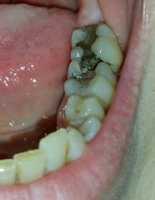
19 Mar Dental Work: Patient Satisfaction No Better With Opioids For Pain
MedicalResearch.com Interview with:
Dr. Romesh P. Nalliah BDS, MHCM
Associate Dean for Patient Services
Clinical Professor
Institute for Healthcare Policy & Innovation
Michigan Institute for Data Science
Director, Synergy Program
MedicalResearch.com: What is the background for this study?
Response: We designed and conducted this study because there is a paucity of knowledge related to opioid prescribing for acute dental pain.
MedicalResearch.com: What are the main findings?
Response: Our main findings were:
- The main finding was that patients taking opioids actually reported worse pain. And it made no difference if it was a routine or surgical extraction. While we do not think that opioids cause more pain, these data are consistent with previous randomized, controlled trials showing acetaminophen and ibuprofen are equal or superior to opioids for pain control with less side effects.
- In addition, patient satisfaction with pain management was no different whether the patient had opioids or not.
- Lastly, we found that roughly 50% of opioid pills were left unused by patients when prescribed for dental extractions. And it didn’t matter if it was a routine extraction or a surgical extraction. While we would suggest eliminating routine opioid prescribing, these data suggest that for those that do receive opioids, small numbers of pills would be more appropriate.
MedicalResearch.com: What should readers take away from your report?
Response: The takeaway messages are:
1.For patients: Frequently, patients come in to us requesting opioids for their pain management even before having their dental procedure. It’s difficult for them to conceive that over the counter drugs could be more effective than a prescription opioid to manage dental pain. These patients must re-think their preconceived ideas about dental pain.
2.For dentists: I think our study is very liberating for dentists who are torn between trying to satisfy their patients’ pain management needs but reducing opioid prescribing during this opioid crisis. Our study showed that patient satisfaction was no different whether the patient had opioids or not. This is consistent with the surgical literature and means dentists need not fear a loss in satisfaction of clients when they do not prescribe opioids.
MedicalResearch.com: What recommendations do you have for future research as a result of this work?
Response: Our study was retrospective in nature – so patients were reflecting on their pain experience. Future research could focus on real-time pain reporting to compare acute pain with and without opioids. It may be possible to use smart phone applications and other technologies for real-time reporting of pain experience.
MedicalResearch.com: Is there anything else you would like to add?
Response: Pain prescribing is very difficult. Pain is subjective and different patients
experience pain in different ways. Currently, the American Dental Association’s position on opioids is that dentists should limit opioid prescribing to 7-days.
However, my experience and research has taught me that this guideline is far too high and needs to be updated. I think we can come close to eliminating opioid prescribing for acute dental pain. We must recognize that there will be some exceptions like the few patients who cannot tolerate non-steroidal antiinflammatories. However, I believe we can reduce opioid prescribing to about 10% of what we currently prescribe as a profession.
Our disclosures are available in the manuscript.
Citation:
Nalliah RP, Sloss KR, Kenney BC, et al. Association of Opioid Use With Pain and Satisfaction After Dental Extraction. JAMA Netw Open. 2020;3(3):e200901. doi:10.1001/jamanetworkopen.2020.0901
https://jamanetwork.com/journals/jamanetworkopen/fullarticle/2762703
JOIN OUR EMAIL LIST
[mailpoet_form id="5"]We respect your privacy and will never share your details.
[last-modified]
The information on MedicalResearch.com is provided for educational purposes only, and is in no way intended to diagnose, cure, or treat any medical or other condition. Always seek the advice of your physician or other qualified health and ask your doctor any questions you may have regarding a medical condition. In addition to all other limitations and disclaimers in this agreement, service provider and its third party providers disclaim any liability or loss in connection with the content provided on this website.
Last Updated on March 19, 2020 by Marie Benz MD FAAD

